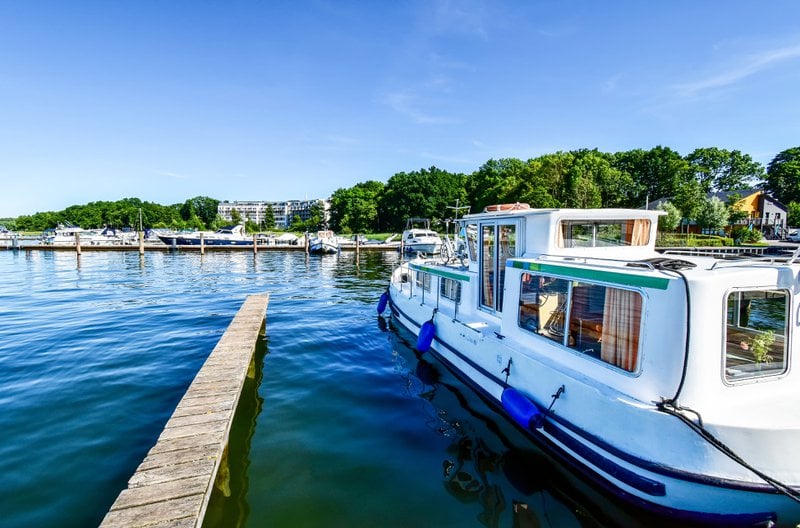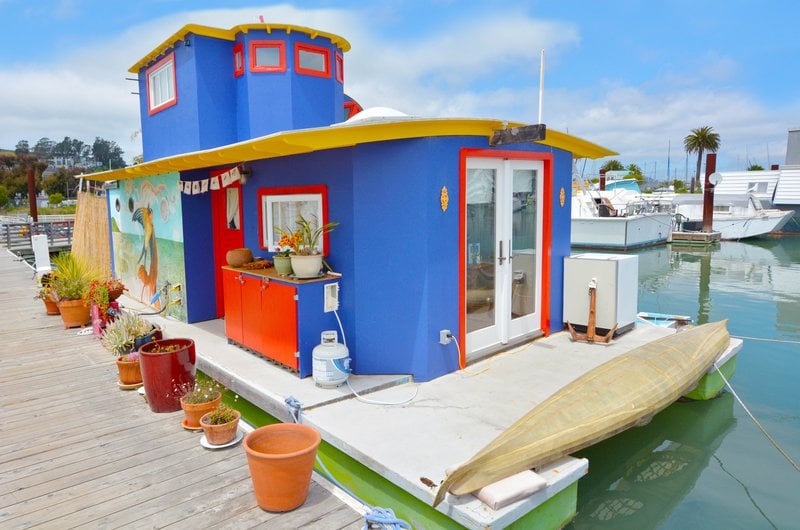Buying a house is a big decision. Buying a boat is a big decision. But buying a houseboat? Now that is something you really want to consider carefully. Whether you are figuring out if a houseboat is a good investment or if living on one will save you money, there are many aspects you should consider.
If you are thinking about buying a houseboat, here are 15 things you should know:
- How Much Is the Average Houseboat?
- What Should I Look for When Buying a Houseboat?
- Can You Get a Mortgage to Buy a Houseboat?
- Should You Buy a New or Used Houseboat?
- How Will You Use Your Houseboat?
- Is It Cheaper to Live on a Houseboat?
- Do You Have to Pay Taxes on a Houseboat?
- What Are the Financial Advantages and Disadvantages of Owning a Houseboat?
- Do Houseboats Depreciate?
- Can You Live on a Houseboat Year-Round?
- How Much Does It Cost to Dock a Houseboat?
- How Fast Do Houseboats Go?
- What About Using the Bathroom on a Houseboat?
- What About Pets on a Houseboat?
- Are Houseboats Worth It?

1. How Much Is the Average Houseboat?
While an average houseboat costs $50,000, there are many different types of houseboats which greatly vary in price. Some look more like typical houses, while others appear to be 100% boat. Perhaps the most popular style of the houseboat, though, is a flat pontoon or barge-like vessel topped with four walls and a roof. Many of these kinds of houseboats come complete with a full second story or, at least, a deck where owners can sit out and relax on the water.
While prices vary dramatically, you can certainly find a decent-quality houseboat in the 600-square-foot range for around $50,000. If you go much less than that, you may be dealing with a fixer-upper. And, if you go much higher, you could end up with a slightly past-its-prime yacht. Of course, there are also more luxurious half-a-million-dollar plus options available to the wealthier houseboat buyer.
2. What Should I Look for When Buying a Houseboat?
The main thing you have to consider when looking at houseboats is your lifestyle. How much room do you need? How many pets do you have? Do you like going for a jog every morning? Do you like to cook? All of these things and everything else you do on a daily basis needs to be considered. If you look at your future houseboat lifestyle with rose-colored glasses, you are more likely to make a mistake. Be honest with yourself when weighing the pros and cons of living on a houseboat, because both certainly exist.
3. Can You Get a Mortgage to Buy a Houseboat?
It depends. If the question is whether you can finance the purchase of your houseboat, the answer is yes. But, the thing to understand is that there is a difference between a houseboat and a floating home. A floating home is just like a barge that is tethered to a dock. You CAN get a mortgage on a floating home. But a houseboat has an engine and moves. As such, lenders think of houseboats more like RVs.
You can get an RV loan to pay for your houseboat, but the terms will generally be shorter than what you can get with a traditional mortgage. There are some lenders, however, who offer loans in the 20-year range for a houseboat.
4. Should You Buy a New or Used Houseboat?
This depends on your mechanical expertise. If you know a lot about boats and are confident you can fix most problems, go used! If you know what you are doing, you can save a lot of money by buying a used houseboat. But if you are not a boat expert, you might want to opt for paying a bit more and getting something that is under warranty and less likely to stop working or break.

5. How Will You Use Your Houseboat?
Another thing to consider when buying a houseboat is how you are going to use it. Is your houseboat going to be your primary residence (despite not being a popular home type)? Is it something you only use on the weekends? Or, is it just a fun addition to your annual lake vacation? If your houseboat is a primary residence, you need to think about kitchen space, bathrooms, and many other practical considerations. But, if you are going to use it just for play, you can optimize its design around fun and comfort.
6. Is It Cheaper to Live on a Houseboat?
Yes, living on a houseboat is often significantly cheaper than a traditional home. The average annual cost of living on a houseboat is estimated at only around $6,000. This is one of the reasons why many seniors have chosen to retire on houseboats—they offer an inexpensive, alternative living option.
7. Do You Have to Pay Taxes on a Houseboat?
Unlike a traditional home, you usually don’t have to pay property taxes on a houseboat. The main fixed costs associated with houseboats are:
- Slip or dock rental fees
- Insurance
- Sales tax
8. What Are the Financial Advantages and Disadvantages of Owning a Houseboat?
The financial advantages of living on a houseboat include:
- No property taxes
- Generally lower maintenance costs
- Potential houseboat tax breaks
- No yard to take care of or pay for landscaping
The financial disadvantages of living on a houseboat include:
- Regularly paying to have your sewage pumped
- Maintenance costs related to the engine and other parts of the houseboat
- Fuel costs
- Dock or marina costs
9. Do Houseboats Depreciate?
Like most things, yes, houseboats depreciate. If you maintain your houseboat well, though, it can hold a good amount of its value. There are certain timeless types of houseboat designs that do even better than others when it comes to maintaining value.

10. Can You Live on a Houseboat Year-Round?
Yes, you can live on a houseboat year-round. If you live on a houseboat in an area where the water freezes in winter, you will have to make certain accommodations. But, depending on where you live, it is possible that you will still be able to stay on your boat.
11. How Much Does It Cost to Dock a Houseboat?
When it comes to parking or docking a houseboat, the price can vary from nothing to several thousand dollars a month. There are public waters around the country where you can anchor your houseboat and live for free. However, if you want your houseboat to be attached to land in an easily accessible way, you are going to want to dock it properly. Dock owners charge rent just like typical landlords. Thankfully, though, dock rents are usually much cheaper than what you would pay for an apartment.
If you are looking to rent a dock space, expect to pay anywhere from a few hundred dollars to $1,000 a month. The dock should have an electrical outlet so you can power your houseboat without running the engine. In addition to the dock rental price, you will also need to pay utilities to cover water and electricity.
12. How Fast Do Houseboats Go?
Houseboats are not built for speed. There are some houseboats, though, that are essentially just yachts— which can move very rapidly up to around 40 mph. If you go with a houseboat design where a literal house sits atop a pontoon-style raft then, odds are, the boat will go very slow—perhaps only a few mph or “knots.” Still, speed should not be a top priority when thinking about buying a houseboat.
13. What About Using the Bathroom on a Houseboat?
Using the bathroom on a houseboat is one of those practical considerations that people might wonder about. It is one of many factors that are important to consider.
To address the question: yes, houseboats have normal bathrooms. To the naked eye, a houseboat bathroom may look just like a bathroom you would find in a small apartment. The difference, however, lies in the plumbing. In a more traditional home, you flush the toilet and waste goes into the sewage system or a large underground storage tank. On a houseboat, sewage is stored in a smaller tank. As such, you need to have your house boat’s sewage tank regularly emptied.
You should not have too much trouble finding a local company that can drain your house boat’s sewage tank; most waterfront locations have many of them. Depending on how often you are on your houseboat, you may have to empty its tanks emptied every month or only a few times a year.
14. What About Pets on a Houseboat?
While there are some exceptions, pets do not always thrive on houseboats. If your boat is anchored somewhere surrounded by water, you probably should not have a pet. But if your houseboat is in a marina (as most are), you may be okay. Still, even if your houseboat is docked at a marina, you must consider that pets, especially dogs, need exercise. So, you should plan on taking them off the houseboat and around the marina for regular walks and or jogs.
15. Are Houseboats Worth It?
It depends! If you love the water and enjoy being surrounded by nature, buying a houseboat can offer an alternative lifestyle that some people find incredibly enjoyable. Life on the water can be great. Plus, many houseboat communities are renowned for their hospitality and old-fashioned sense of community. If you find those things appealing, you may love living on a houseboat. The key is to be brutally honest with yourself. Think about what you like about living on land and whether you could continue those things on a houseboat. That is a good place to start.
Conclusion
Hopefully, these 15 questions will help you decide whether you will be taking to one of the seven seas or keeping your feet on dry land. Just remember that there are pros and cons to every residential purchase, and you need to carefully consider each of them to make an intelligent, well-informed decision.







